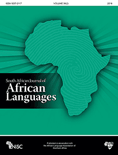
South African Journal of African Languages
Scope & Guideline
Advancing the discourse on African languages and literature.
Introduction
Aims and Scopes
- Language Documentation and Analysis:
The journal publishes research that documents and analyzes various African languages, including their grammatical structures, phonetics, and sociolinguistic contexts. - Language and Education:
It explores the intersection of language and education, particularly how African languages are utilized in educational contexts and the implications for language policy and literacy. - Cultural and Societal Implications of Language:
The journal examines how language shapes cultural identity and social dynamics, focusing on issues such as language rights, language attitudes, and the role of language in community engagement. - Translation and Interpretation Studies:
Research on translation practices, challenges, and methodologies in the context of African languages is a core component, emphasizing the importance of accurate representation in multilingual societies. - Linguistic Innovation and Change:
The journal highlights studies on linguistic innovation, including code-switching, language contact phenomena, and the evolution of language in contemporary settings.
Trending and Emerging
- Language Rights and Policy:
There is an increasing focus on language rights, including the evaluation of language policies and their impacts on communities, particularly marginalized language groups in South Africa. - Digital Linguistics and Technology:
Research exploring the intersection of language and technology, including the use of AI in language development and digital communication, is gaining traction. - Sociolinguistic Perspectives on Identity:
Emerging themes explore how language interacts with identity, particularly in relation to immigration, gender, and socio-political contexts, reflecting ongoing societal changes. - Indigenous Knowledge and Language:
An emphasis on the role of indigenous languages in conveying cultural knowledge and practices is on the rise, highlighting the importance of language preservation. - Language in Popular Culture:
There is a growing interest in how African languages are represented and used in popular culture, including music and media, reflecting broader social trends.
Declining or Waning
- Historical Linguistics:
Research focusing on the historical development of African languages is less frequently published, suggesting a possible shift towards more contemporary linguistic studies. - Linguistic Theory Application:
There appears to be a decline in papers applying traditional linguistic theories to African languages, indicating a move towards more applied and practical linguistic research. - Comparative Linguistics:
Studies that compare African languages with non-African languages have decreased, possibly reflecting a growing emphasis on internal language dynamics rather than cross-linguistic comparisons.
Similar Journals

Mandenkan-Bulletin Semestriel d Etudes Linguistiques Mande
Pioneering Research in Mande LinguisticsMandenkan-Bulletin Semestriel d'Etudes Linguistiques Mande is an esteemed academic journal dedicated to the exploration of Mande languages and linguistics, published by the Centre National de Recherche Scientifique in France. With its ISSN 0752-5443, this journal has established itself within the linguistic community, holding a notable Q3 ranking in both the Linguistics and Language category as well as respectable standings in Scopus ranks, placing it in the 55th percentile for language and linguistics. Since its inception in 2018, it has been pivotal in publishing groundbreaking research that advances our understanding of the Mande language family and its cultural implications. Although currently not open access, the journal offers a wealth of knowledge fostered through rigorous peer-reviewed articles aimed at linguists, researchers, and students alike, making significant contributions to the fields of linguistics and African studies.
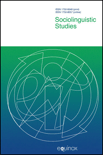
Sociolinguistic Studies
Exploring the Intersections of Language and SocietySociolinguistic Studies, published by EQUINOX PUBLISHING LTD, is a premier academic journal dedicated to advancing the understanding of language in its social context. With an ISSN of 1750-8649 and an E-ISSN of 1750-8657, this journal plays a vital role in the fields of linguistics, sociology, and political science, offering a platform for interdisciplinary research that bridges diverse theoretical frameworks and methodologies. Since its inception in 2008, the journal has remained committed to publishing high-quality research that contributes to the critical engagement with sociolinguistic phenomena globally. With a categorization of Q3 in both Linguistics and Language and Sociology and Political Science as of 2023, and notable Scopus rankings reflecting its intellectual contribution, Sociolinguistic Studies is essential for researchers, professionals, and students aiming to explore the intricate relationships between language, society, and identity. Although open access is not currently available, the journal's scholarly impact continues to grow as it shapes contemporary discussions in sociolinguistics through rigorous peer-reviewed articles.

Caplletra
Unveiling Insights into Language's IntricaciesCaplletra is a distinguished open-access journal dedicated to the field of linguistics and language studies, published by PUBL ABADIA MONTSERRAT since its inception. Based in Barcelona, Spain, this journal has been a vital resource for researchers, professionals, and students engaged in the intricate explorations of language and its applications since its transition to open access in 2005. Despite its current quartile ranking of Q4 within the Linguistics and Language category as of 2023, Caplletra continues to serve as an inclusive platform, fostering a dialogue that encourages a diverse range of scholarly contributions. Covering an expansive scope in the converged years from 2018 to 2024, it plays a crucial role in disseminating innovative research and insights. With its ISSN 0214-8188 and E-ISSN 2386-7159, Caplletra is committed to making academic work accessible to all, enhancing the landscape of linguistic scholarship and reflecting the evolving nature of language studies.
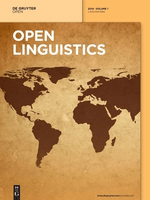
Open Linguistics
Championing open dialogue in diverse linguistic fields.Open Linguistics is a premier open access journal dedicated to advancing the field of linguistics, published by DE GRUYTER POLAND SP Z O O. Since its inception in 2014, the journal has consistently provided a platform for innovative research and critical discourse in various subfields of linguistics. With an impressive Q1 ranking in the linguistics category as of 2023, Open Linguistics is recognized for its significant contributions, ranking #223 out of 1088 in Arts and Humanities, as well as achieving a commendable #260 out of 1167 in Social Sciences. The journal's open access policy ensures that research is freely accessible to both scholars and practitioners, fostering a collaborative and inclusive academic community. With a focus on original research, reviews, and theoretical papers, Open Linguistics is positioned as an essential resource for researchers, educators, and students seeking to deepen their understanding of language and its diverse applications in society.

NEUPHILOLOGISCHE MITTEILUNGEN
Connecting Scholars through Language and TheoryNEUPHILOLOGISCHE MITTEILUNGEN, published by the esteemed Modern Language Society, stands as a significant contribution to the domain of Language and Linguistics. With a history dating back to 1971, this journal has consistently provided an academic platform for researchers and scholars, navigating through the intricacies of philology and linguistic studies. Although it is indexed in Scopus with rankings reflecting its position in the Arts and Humanities and Social Sciences categories, it currently does not offer Open Access, which may require interested parties to seek institutional access for its wealth of content. The journal has experienced periods of coverage discontinuation in recent years, yet it remains a valued source for advancing the understanding of language theories and linguistic practices. Its location in Helsinki, Finland, offers a unique European perspective on global linguistic issues. The journal is ideal for those looking to engage with evolving linguistic trends and contribute to contemporary discussions in the field.
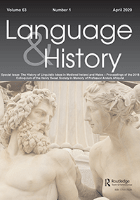
Language & History
Charting the Evolution of Language Across TimeLanguage & History is a distinguished journal published by Routledge Journals, Taylor & Francis Ltd, focusing on the intersection of linguistics and historical context. With an ISSN of 1759-7536 and an E-ISSN of 1759-7544, this journal serves as a vital platform for scholars exploring the dynamic relationship between language evolution and historical narratives. It is recognized for its contributions to the field, holding a Q2 ranking in Linguistics and Language for 2023, reflecting its esteemed position among peer publications. Indexed in Scopus with notable rankings in both Arts and Humanities and Social Sciences, Language & History aims to foster innovative research, shed light on language change, and encourage cross-disciplinary dialogue. The journal operates without open access, providing rigorous peer-reviewed content for researchers, professionals, and students alike, ensuring that cutting-edge studies remain at the forefront of linguistic research. Published biannually, it continues to attract a diverse array of contributions that enrich the understanding of language within historical contexts, making it an essential resource in the academic community.
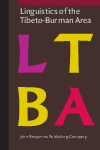
Linguistics of the Tibeto-Burman Area
Pioneering Research in the Heart of Tibeto-Burman LinguisticsLinguistics of the Tibeto-Burman Area is a premier journal dedicated to the study and exploration of the Tibeto-Burman languages, offering a significant platform for researchers, scholars, and practitioners in the field of linguistics. Published by John Benjamins Publishing Co, this journal not only maintains rigorous scholarly standards but also aims to contribute to the understanding of language diversity and evolution within the Tibeto-Burman region. With an impressive Q2 ranking in linguistics and language, it ranks in the 49th percentile within Arts and Humanities and the 45th percentile in Social Sciences, highlighting its relevance and quality in the academic community. Since its inception in 2011, the journal has been at the forefront of disseminating research that encourages interdisciplinary dialogue and fosters insights into language structure, use, and cultural implications. Though not an open access publication, it remains accessible to institutions and individuals alike, ensuring that vital academic discussions continue. The ISSN for print is 0731-3500 and for the electronic version, 2214-5907, facilitating the work of the growing scholarly community engaged in Tibeto-Burman linguistics.

Journal of Jewish Languages
Illuminating the Evolution of Jewish Linguistic TraditionsThe Journal of Jewish Languages, published by BRILL, is a leading academic platform dedicated to the interdisciplinary study of Jewish languages, exploring their historical, cultural, and linguistic dimensions. With an ISSN of 2213-4387 and an E-ISSN of 2213-4638, this journal serves as a vital resource for researchers and students, offering insights into the evolution and significance of Jewish linguistic traditions from 2015 to 2024. As a Q3-ranked journal in the fields of Cultural Studies and History, and a Q4 ranking in Linguistics and Language, it presents a diverse array of scholarly articles that contribute to the understanding of Jewish languages in various cultural contexts. With commendable Scopus rankings that place it within the 60th to 75th percentile across multiple categories in Arts, Humanities, and Social Sciences, the Journal of Jewish Languages continues to be a pivotal venue for innovative research and dialogue. While the journal is not open access, it nonetheless remains an essential reading for anyone vested in the linguistics and cultural aspects of Judaism.
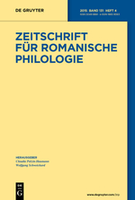
ZEITSCHRIFT FUR ROMANISCHE PHILOLOGIE
Exploring the Rich Tapestry of Romance Languages and LiteratureZEITSCHRIFT FUR ROMANISCHE PHILOLOGIE, published by Walter de Gruyter GmbH, stands as a prominent peer-reviewed journal dedicated to the fields of Linguistics, Literature, and Literary Theory. Established in 1877 and continuing its legacy to the present day, this esteemed journal offers a platform for comprehensive scholarship that explores the intricacies of Romance languages and their literary heritage. With a notable Q1 ranking in Literature and Literary Theory and a Q2 ranking in Linguistics and Language, it has secured its place among leading resources in the humanities. Researchers, educators, and students benefit from its rich historical context and current contributions to the understanding of Romance languages and literature. Though currently not available as Open Access, the journal prioritizes the dissemination of high-quality research, making significant strides in fostering academic dialogue and advancement. Its address at Genthiner Straße 13, Berlin, Germany, situates it in a hub of scholarly activity, bridging the past with contemporary literary discourse.

Forma y Funcion
Fostering dialogue and discovery in language studies.Forma y Funcion is a distinguished open access journal published by UNIV NACIONAL COLOMBIA, FAC CIENCIAS HUMANAS, dedicated to advancing the fields of linguistics and language studies. With an ISSN of 0120-338X and an E-ISSN of 2256-5469, the journal has been committed to open access since 2005, ensuring that research is freely accessible to scholars, professionals, and students around the globe. Situated in Bogotá, Colombia, it has established itself as a pivotal platform within the academic community, achieving a commendable Q2 ranking in 2023 in the subfield of Linguistics and Language. Its Scopus rankings further underscore its relevance, placing it in the 55th percentile among peers in the Arts and Humanities and the 51st percentile within Social Sciences. Covering a range of topics related to language and linguistics, Forma y Funcion aims to foster cutting-edge research and dialogue, making significant contributions to the field from 2019 through 2024 and beyond.